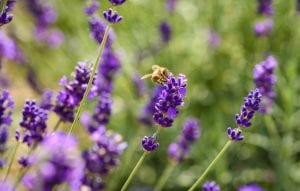Written by Angeline A. De Leon, Staff Writer. In a randomized cross-over trial, lavender inhalation aromatherapy significantly improved psychological and behavioral problems in the participating Chinese elderly suffering from dementia.
 While the core feature of clinical dementia is represented by cognitive deficit, symptoms of behavioral and psychological problems are also prevalent and can cause significant distress to patients and their families 1. Agitated behavior can often result in reduced socialization and even loss of social support from caregivers 2. For individuals with dementia, the use of aromatherapy signifies a promising alternative to pharmacological therapies aimed at alleviating related psychological and behavioral problems. Studies report success with aromatherapy in improving sleep and decreasing disturbing behavior in older adults with dementia 3,4. In addition to being relatively non-invasive, aromatherapy is uniquely beneficial in its ability to stimulate energy and motivational behavior 5, which may be particularly useful for older individuals with reduced mobility and a generally sedentary lifestyle. Given the various benefits associated with aromatherapy, researchers at the Castle Peak Hospital in Hong Kong examined the efficacy of this complementary therapy in treating agitated behavior in patients with dementia.
While the core feature of clinical dementia is represented by cognitive deficit, symptoms of behavioral and psychological problems are also prevalent and can cause significant distress to patients and their families 1. Agitated behavior can often result in reduced socialization and even loss of social support from caregivers 2. For individuals with dementia, the use of aromatherapy signifies a promising alternative to pharmacological therapies aimed at alleviating related psychological and behavioral problems. Studies report success with aromatherapy in improving sleep and decreasing disturbing behavior in older adults with dementia 3,4. In addition to being relatively non-invasive, aromatherapy is uniquely beneficial in its ability to stimulate energy and motivational behavior 5, which may be particularly useful for older individuals with reduced mobility and a generally sedentary lifestyle. Given the various benefits associated with aromatherapy, researchers at the Castle Peak Hospital in Hong Kong examined the efficacy of this complementary therapy in treating agitated behavior in patients with dementia.
A total of 60 Chinese older adults with dementia were recruited in a randomized, cross-over trial. Participants were randomized to treatment with aromatherapy (lavender inhalation) or a placebo control (sunflower inhalation), with each individual receiving both treatments for three weeks respectively with a 2-week washout period separating the first and second arms of the study. Severity of agitated behavior was evaluated using the Chinese versions of the Neuropsychiatric Inventory (CNPI) and the Cohen-Mansfield Agitation Inventory (CCMAI) at the beginning and each of each 3-week treatment period.
Results indicated that at the end of treatment with lavender aromatherapy, mean total CNPI scores decreased from 63.17 to 58.77 (t = 14.59, p < 0.0001) and CCMAI decreased from 24.68 to 17.77 (t = 10.79, p < 0.001). Significant reduction was also noted on five sub-scores of the CNPI, following lavender inhalation: “Agitation” changed from 6.49 to 5.63 (t = 6, p < 0.0005); “Dysphoria” changed from 0.34 to 0.13 (t = 2.77, p < 0.03); “Irritability” changed from 5.39 to 4.61 (t = 5.19, p < 0.001); “Aberrant Motor Behavior” changed from 4.81 to 4.53 (t = 2.60, p < 0.01); and “Night-Time Behavior” changed from 6.57 to 5.29 (t = 6.16, p = 0.001). No treatment effects were reported for the placebo group.
Overall, findings from this crossover study highlight the psychological and behavioral benefits associated with the use of aromatherapy oils such as lavender. Aromatherapy was not only well-tolerated in patients with dementia, but was shown to significantly attenuate agitated behaviors that are otherwise difficult to control using pharmacological treatment alone. Given the limited sample size of the study, however, it would be important to replicate findings in a larger population of dementia patients.
Source: Lin PW, Chan W, Ng B, et al. Efficacy of aromatherapy (Lavendula angustifolia) as an intervention for agitated behaviors in Chinese older adults with dementia: a cross-over randomized trial. International Journal of Geriatric Psychiatry. 2007; 22: 405-410. DOI: 10.1002/gps.1688.
© 2007 John Wiley & Sons, Ltd.
Posted November 21, 2017.
References:
- Choy CNP, Lam LCW, Chan WC, Li SW, Chiu HFK. Agitation in Chinese elderly: validation of the Chinese version of the Cohen-Mansfield Agitation Inventory. International psychogeriatrics. 2001;13(3):325-335.
- Sourial R, McCusker J, Cole M, Abrahamowicz M. Agitation in demented patients in an acute care hospital: prevalence, disruptiveness, and staff burden. International Psychogeriatrics. 2001;13(2):183-197.
- Smallwood J, Brown R, Coulter F, Irvine E, Copland C. Aromatherapy and behaviour disturbances in dementia: a randomized controlled trial. International journal of geriatric psychiatry. 2001;16(10):1010-1013.
- Holmes C, Hopkins V, Hensford C, MacLaughlin V, Wilkinson D, Rosenvinge H. Lavender oil as a treatment for agitated behaviour in severe dementia: a placebo controlled study. International journal of geriatric psychiatry. 2002;17(4):305-308.
- Ballard CG, O’Brien JT, Reichelt K, Perry EK. Aromatherapy as a safe and effective treatment for the management of agitation in severe dementia: the results of a double-blind, placebo-controlled trial with Melissa. Journal of clinical Psychiatry. 2002;63(7):553-558.

